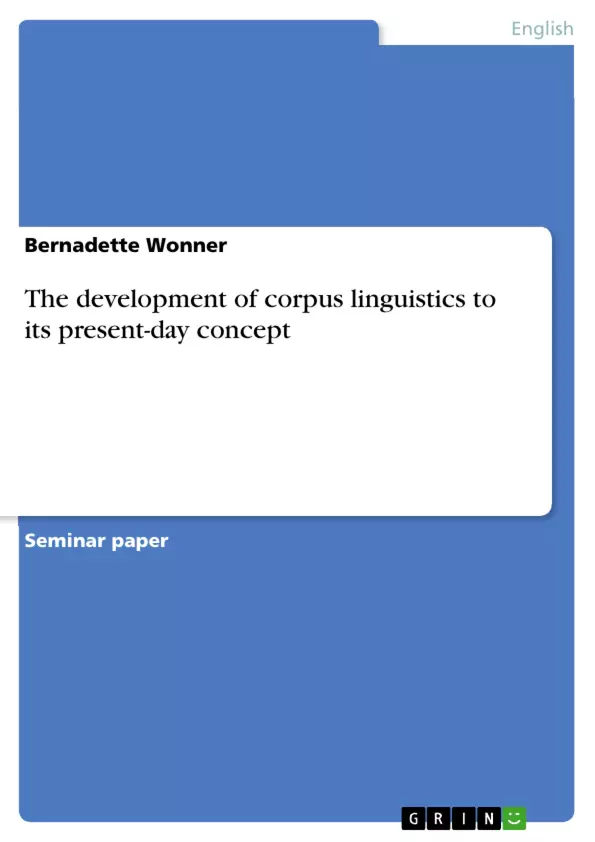[...] This paper will provide an overview of the different stages that CL has gone through. Early Corpus Linguistics will be presented first, a term that describes all corpus-based work up to the end of the 1950s. That is the time when Noam Chomsky makes the early researchers reflect on their work under certain aspects which neutralize somehow the work which was done up to that point. As an effect corpus research faces a certain discontinuity. Nevertheless, corpus-based work does not totally cease and the improvements in computer technology provide completely new possibilities in corpus research. Over the decades a considerable amount of machine-readable corpora is created for more and more different purposes and they initiate all variations of analysis. After the presenation of the chronological development of CL, the last but one chapter of the paper will finally deal with the concept of modern corpus linguistics and will give the definition of a corpus, which is not yet an definite thing to do. There is still a lot of work going on to improve the corpus linguistic methodology. The last chapter will give an overview of future prospects.
Table of Contents
- Introduction
- Early Corpus Linguistics
- The concept of early corpus linguistics
- Corpus-based work up to the end of the 1950s.
- Criticism on corpus linguistics
- Noam Chomsky and Abercrombie
- Evaluation of the criticism
- The influence of computer technology and techniques
- Different generations of corpora
- The concept of modern corpus linguistics.
- Definition of a corpus
- Future prospects in corpus linguistics.
- Conclusion
Objectives and Key Themes
This paper aims to provide a comprehensive overview of the development of corpus linguistics, tracing its evolution from its early beginnings to its present-day status as a well-established methodology in the linguistic field. The paper highlights the impact of technological advancements on the field and explores the changing concept of corpus linguistics throughout its history. It also examines the criticisms that corpus linguistics has faced and evaluates their validity.
- Historical development of corpus linguistics
- Influence of technological advancements
- The changing concept of corpus linguistics
- Criticisms of corpus linguistics
- Future prospects of corpus linguistics
Chapter Summaries
- Introduction: This chapter introduces the topic of corpus linguistics, highlighting its growing popularity and addressing the question of what corpus linguistics entails. It also provides a brief overview of the paper's structure and purpose.
- Early Corpus Linguistics: This chapter explores the origins of corpus linguistics, tracing the history of corpus-based work up to the end of the 1950s. It discusses the concept of early corpus linguistics, highlighting the objective and descriptive approach to language analysis that characterized this period. This chapter also delves into specific examples of early corpus-based studies, such as those conducted by Käding, Fries and Traver, and Bongers.
- Criticism on Corpus Linguistics: This chapter examines the criticisms raised against corpus linguistics by Noam Chomsky and Abercrombie. It explores the basis for these criticisms and their implications for the development of the field.
- The influence of computer technology and techniques: This chapter discusses the impact of computer technology on corpus linguistics, highlighting the evolution of different generations of corpora and their increasing accessibility and sophistication.
- The concept of modern corpus linguistics: This chapter explores the concept of modern corpus linguistics, providing a definition of a corpus and discussing the ongoing efforts to refine the methodology of corpus analysis. This chapter explores how technological advancements have transformed corpus linguistics from a marginal to a mainstream methodology.
Keywords
The key concepts and terms explored in this paper include corpus linguistics, corpus-based research, language description, objective data, technological advancements, computer technology, corpus development, and the evolution of linguistic methodologies. The paper also delves into the criticisms directed at corpus linguistics and examines the theoretical and methodological implications of these critiques.
- Citation du texte
- Bernadette Wonner (Auteur), 2005, The development of corpus linguistics to its present-day concept, Munich, GRIN Verlag, https://www.grin.com/document/38258



